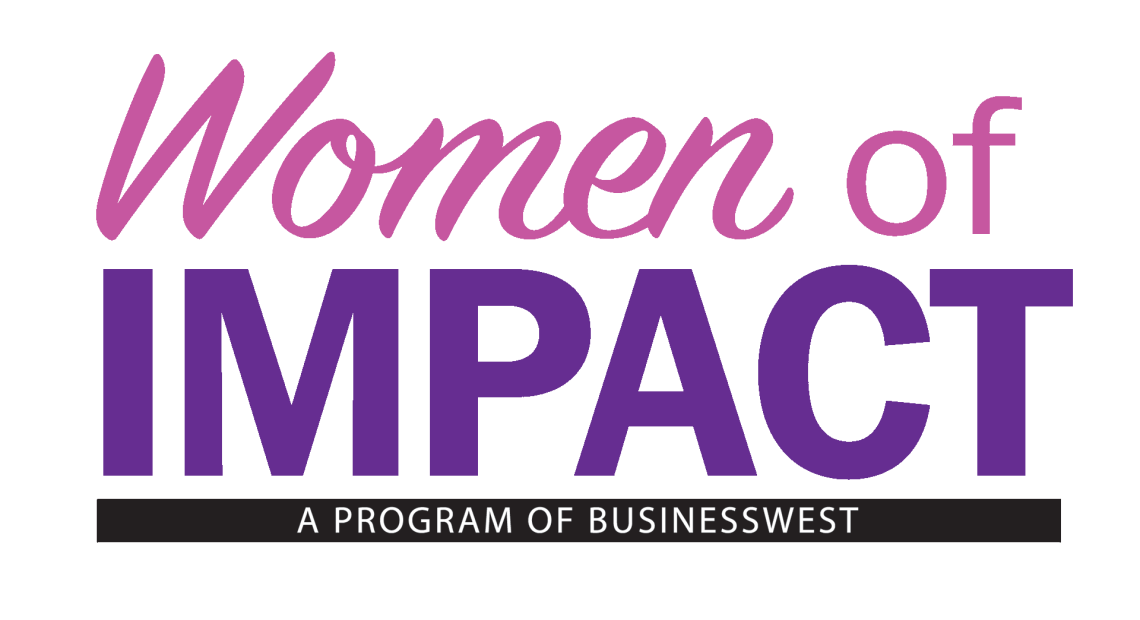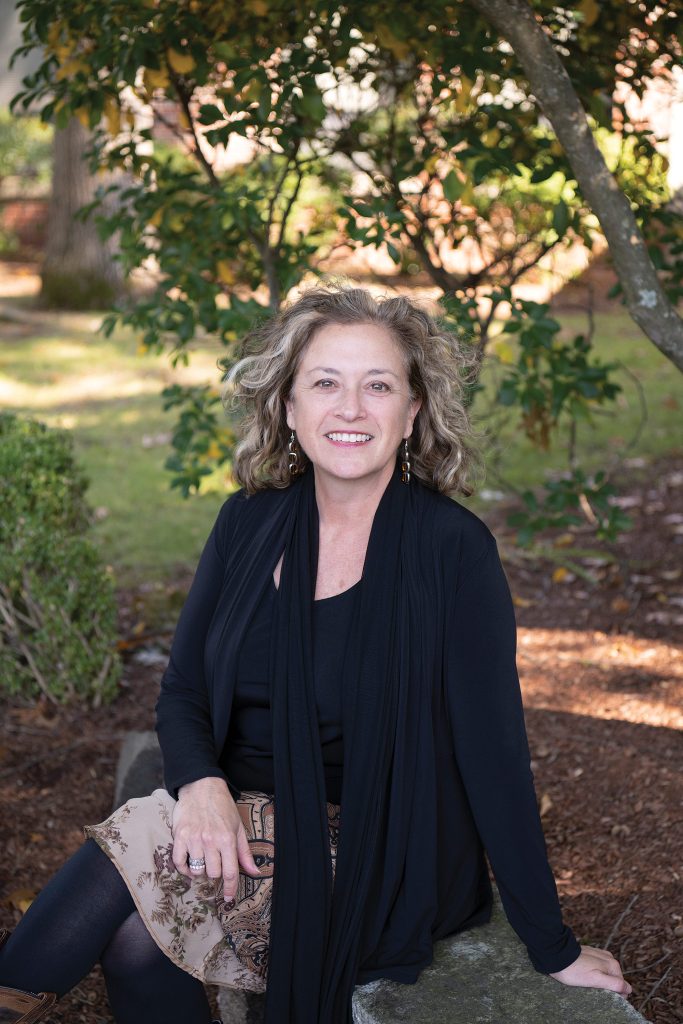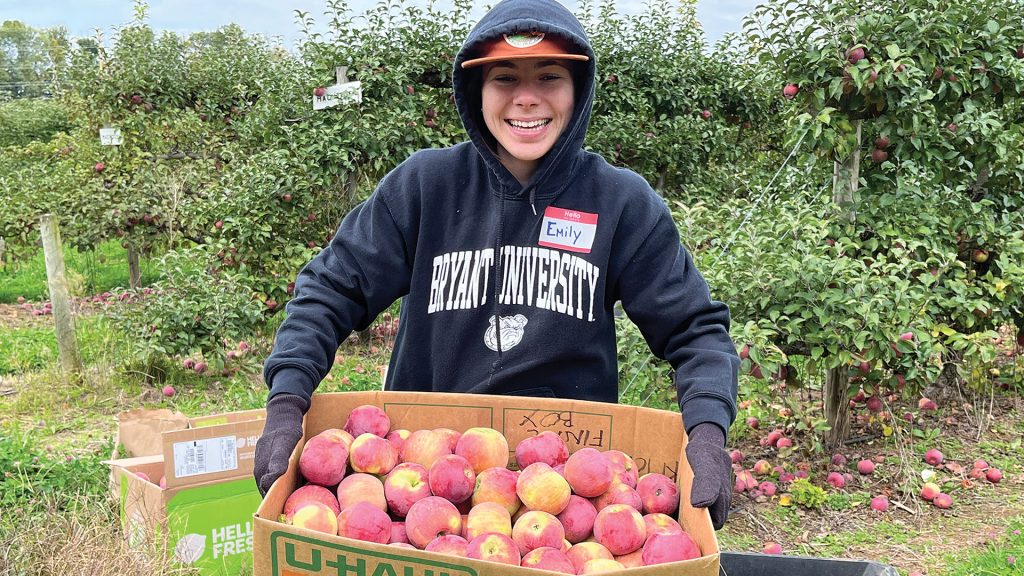
Jodi Falk
Director, Rachel’s Table
She’s Choreographed a Broader, More Holistic Mission at This Critical Nonprofit

Jodi Falk knows what it’s like to be like food-insecure.
For a brief time, she received assistance from the program known as WIC (Women, Infants, and Children). It’s not something she can easily talk about — and, in fact, it was something she couldn’t talk about until very recently, mostly because of the stigma attached to being in the program.
She recalled that time for BusinessWest, however, because, by doing so, she believes she’s helping to address that stigma, while also putting into perspective the feelings of those that she and the organization she leads, Rachel’s Table, serve day in and day out.
“Those were the days when it wasn’t a card you can give to a cashier or put in a machine, but checks to hand to a person who made sure that what you purchased was on their list — and this could take a while, which was embarrassing,” she recalled. “I used to look around the store to see if I knew anyone, and if I did, I would wait until I was sure they had left the store before going to the register.”
Elaborating, she said she is still embarrassed to talk about those experiences, but admits that they made her aware, and understanding, of what others may be going through when they are on government assistance. And she believes her story has given her some perspective that each individual needs to be treated with “dignity and care.”
In short, those experiences have helped in her role as director of Rachel’s Table, a program of the Jewish Federation of Western Massachusetts, and they are not the only chapter from her past that she says has earned that distinction.
Indeed, Falk spent many years professionally as a dancer, choreographer, and teacher, both here and abroad. And while her work administering Rachel’s Table might seem worlds removed from those vocations, the skill sets, and her many experiences in those roles, dovetail nicely with her current assignment. In many ways, they inspired it.
“For several of those years, besides working in the professional arts world, I also taught and choreographed in the community dance and arts world, where I worked with various populations, such as young teen moms or young women who were incarcerated and in treatment centers, elders in nursing homes, people in recovery, families in foster-care communities, and more,” she explained.
“I focused on art making as a means of making voices heard and bodies seen that aren’t always heard and seen. I became more interested in the lives of those with whom I was dancing, in their nourishment, and when Rachel’s Table had an opening for a director, I felt that I could serve more people with nourishment from a literal as well as figurative perspective.”
“We live in a world where we sometimes we don’t see the ‘other,’ if you will. How do we learn to live to live together in a much bigger society, a much broader world? We don’t know each other’s story until we really know each other’s story.”
With that, she referenced not only why she took on this new career challenge, but how dance and choreography have made her a better administrator and problem solver. And, in some ways, they help explain why she is a Woman of Impact.
To gain more perspective on why Falk has earned this honor, we need to look at all that she has accomplished since taking the helm at Rachel’s Table in 2019. In short, she has taken the agency “to a new level of food rescue for our very needy community,” said Judy Yaffe, vice president of the advisory board for Rachel’s Table, in nominating Falk as a Woman of Impact.
And she has done this through many new initiatives, including:
• A broadening of the agency’s reach; in the past, it has served only Hampden County, but has expanded into Hampshire and Franklin counties;
• A new program called Growing Gardens, an offshoot of the agency’s gleaning program, whereby constituents focus on growing and harvesting their own food;
• A new partnership with the Food Bank of Western Massachusetts to pick up food from Big Y stores and other large donors;
• A new, fully refrigerated van that will enable the agency to deliver larger quantities of food throughout the year;
• Steps that have enabled Rachel’s Table to rescue 50% more healthy produce, meat, milk, and prepared foods for the more than 50 agencies it serves;
• Upgrades to the volunteer-management program; and
• A significant increase in the number of grants received by the agency, and in the amounts of those grants, as well as a surge in the number of donors to the program.
In short, Falk has been instrumental in essentially expanding the mission and taking it in new directions, while also modernizing the agency, making it more efficient, and, yes, guiding it through a pandemic that brought challenges that could not have been imagined.
As we examine all this in greater detail, it will become abundantly clear why she’s been named a Woman of Impact for 2022.
Growing Passion
As noted earlier, Falk brings a diverse résumé to the table.
She has a bachelor’s degree from Brown and master of fine arts and Ph.D. degrees from Temple University, and she has put them to work in several different capacities.
Most recently, she served as founding director of the dance program at the Pioneer Valley Performing Arts Charter School in South Hadley, where she created nationally recognized dance programs for more than 400 students, produced more than 15 original and critically acclaimed concerts, and oversaw a national touring company. Prior to that, she was program director of the Trinity Lasban Conseratoire of Music and Dance in London. There, she directed and developed a program in choreography and community-engaged arts-education outreach for the institution, among a host of other duties.
Earlier, Falk served as chair of SEPAC (Special Education Parent Advisory Councils for the Greenfield Public School District and Franklin County Region), a family-advocacy organization that provides resources, support, and advice on policy for families of children with special needs. Before that, the was coordinator of Community Engagement for the Five College Consortium in Amherst.
As she mentioned, these various assignments, which provided in experience in everything from teaching and mentoring to grant writing and new program creation, helped prepare her for, and in many ways inspire her interest in, the position at Rachel’s Table. It also provided perspective on the need to fully understand the plight and the challenges of others in order to effectively serve them.
“We live in a world where we sometimes we don’t see the ‘other,’ if you will,” she explained. “How do we learn to live to live together in a much bigger society, a much broader world? We don’t know each other’s story until we really know each other’s story.”
As she goes about her work, she doesn’t talk much about her experiences with WIC, for many reasons. Stigma is one of them, but a bigger reason is that she received assistance for only a short time and moved on from her food insecurity. Her story, she said, doesn’t really reflect the true hardships of those in need.

It is those individuals’ stories that should be told, she said, and their needs that should be addressed.
And this is what she’s been doing since she took the helm at Rachel’s Table, an organization now celebrating its 30th anniversary. Over that time, and especially in recent years, it has evolved and become much more of a holistic agency while still “nourishing people with dignity,” as Falk likes to say.
It carries out its broad mission of battling food insecurity and not only distributing food but first rescuing much of it from restaurants, supermarkets, and other venues in a number of ways and through several different initiatives, including:
• A gleaning program, known as Bea’s Harvest, that works with young people and school groups to engage them in the service of collecting excess produce and donating it to agencies that serve the hungry and homeless in Western Mass.;
• Growing Gardens, which provides the Pioneer Valley with direct access to healthy foods by helping local organizations build gardens to grow culturally appropriate food;
• Bountiful Bowls, a gala staged every two years to raise funds for the agency;
• Outrun Hunger, a biennial 5K run/walk and one-mile fun walk that raises funds to “fill the bowls of those in need”;
• A Hunger Awareness Arts Fest, at which issues of local hunger were highlighted by music and dance performances and art exhibits; and
• A Teen Board, which, partially sponsored by a grant from the Harold Grinspoon Foundation, aims to alleviate childhood hunger and educate their peers about local hunger and poverty issues, and then involve them in being part of the solution.
While overseeing all of this, Falk guided the agency through the pandemic while also blueprinting the agency’s response to it, a response that included raising more than $95,000 for food in the agency’s Healthy Community Emergency Fund; purchasing and delivering more than 5,000 pounds of meat and potatoes, 3,000 pounds of fluid milk, and much more; participating with a network of partners in the USDA Farmers to Families Food Box program, delivering, at times, more than 140,000 pounds of food a month to families in need; and creating and funding a program to give lunches to first responders in all three counties.
Falk brings to all her work that perspective from being on WIC for a short time, but, far more importantly, decades of experience in leadership, inspiring those she works with to be creative, entrepreneurial, and innovative, and forging the partnerships that are critical to a nonprofit being able to not only carry out its mission, but take it in new and different directions, as Rachel’s Table has.
And she brings even greater emphasis to keeping in mind, always, the ideas, thoughts, and feelings of those most affected by food insecurity.
“This model, which we’ve had for 30 years, helps the planet — food doesn’t go into a landfill; it gets delivered to agencies that support people who are in need,” she explained. “And at the same time, I wanted to make sure that we address, more directly, some of the problems that cause food insecurity.”
She’s done that through initiatives such as the Growing Gardens program, which helps any of those agencies that want to grow their own food in collaboration with those they serve.
“Young kids from Christina’s House are getting their hands dirty in the garden, and they’re making their own salads,” she said, citing the example of the Springfield-based nonprofit that provides services to women and their children who are homeless or at risk of homelessness (and whose leader, Shannon Mumblo, was named a Woman of Impact in 2021).
“To me, that’s a bigger story than how many thousands of pounds of food we can deliver,” Falk said, “because it means there is a dignified approach to food choice, a dignified approach to having a choice about what you want to plant and grow, and we’re helping to teach people — or learn with people, because I think we all teach each other — how to make our own food and not wait for a handout.”
Food for Thought
‘Learning with people.’ That’s something that Falk has been doing throughout her career — and, really, her whole life.
It’s a pattern that has continued at Rachel’s Table, an model that has enabled the agency to expand, evolve, rescue more food, deliver more food, grow food, and, in sum, be much more responsive to agencies serving those in need.
It has enabled Rachel’s Table to do something else as well — to hear those it serves and understand their story and their needs.
That’s what Falk has brought to Rachel’s Table. And her accomplishments, not only there but at other institutions where she has enabled voices to be heard, certainly make her a Woman of Impact.
George O’Brien can be reached at [email protected]




